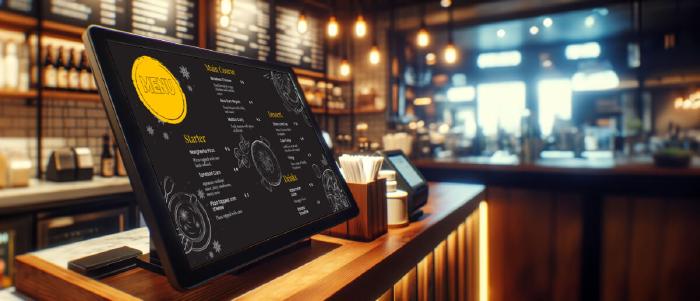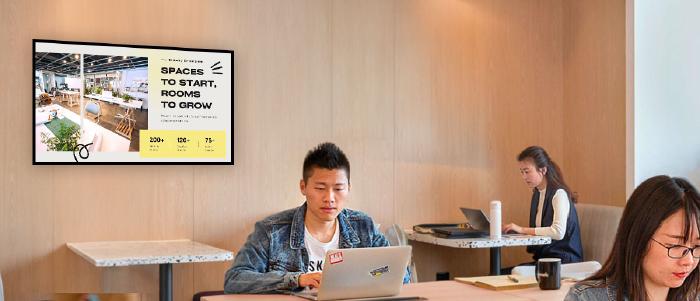
Dec 21 2023
8 min read


How overwhelming is it for homeowners to manage daily schedules and bring a routine to their family lives? If you are struggling with similar challenges, it is time to welcome digital signage.
From tracking routines to reminding family members of upcoming events or appointments, home signage has become part and parcel of modern households.
A recent study showed that U.S. households have an average of 22 connected devices, including smartphones and TVs.
Home digital signage is a technology that enables the display of visual content, such as images, videos, and information, on electronic screens within a residential setting. It is utilized to enhance home aesthetics, communication, and entertainment by showcasing personalized content. A common example includes screens that serve as centralized control panels to manage and monitor smart home devices, such as lighting, thermostats, and security systems.
The explosion of connected devices has paved the way for digital signage in indoor spaces. Let us find out why this is a growing trend in 2023:
1. Centralized informations
Digital signage for home use readily serves as a centralized information hub for your family. When installing digital signage software, sync it up with your Google Calendar and every smart device, and you never have to rely on your devices to remember important events. In a matter of minutes, you have every piece of information at your fingertip, such as:
Doctor’s appointments
Birthdays, anniversaries, party invites
To-do lists and reminders

Digital signage for home use can completely replace physical reminder boards or magnetic whiteboards while keeping your family members informed about important messages.
So now, it’s impossible to forget your kids’ school events or your appointments. An extensive digital screen on the living room wall is screaming all the reminders at you!
2. Home automation
Nearly 8 out of 10 homes today have smart home devices. Integrating digital signage with these devices, for example, lights and fans, security camera feeds, and door locks, is always a smart level-up.
3. Emergency scenarios
Home digital signage equipped with emergency alert systems can save your family from disasters like tornadoes, earthquakes, fire, gas leakage, chemical spills, trespassers, and other emergencies by keeping them informed through:
CAP (Common Alerting Protocol) notifications
Customized messages pre-built for emergencies
Displaying evacuation routes

4. Energy savings
Homeowners can use digital signage to keep tabs on daily energy consumption and take measures for sustainable living. Your home digital signage screens can be programmed to monitor and display real-time energy usage. This way, you can create an energy-efficient household by making eco-friendly choices.

5. Security & privacy controls
Digital signage must have robust and secure authentication for multiple home devices. It should be able to monitor all attended and unattended devices and alert the owners to lock their phones or personal applications. Signage software with centralized management enables you to manage remotely, monitor, and control all authenticated devices from a single device. You can even restrict access to specific applications through remote parental controls and block unnecessary applications without physical existence.
6. Health & lifestyle
Personal digital signage for home use can boost a healthy lifestyle through easy integration with fitness apps. What better motivation than waking up daily to your fitness results on a home digital signage?
The technology can import fitness data from your apps and display:
Number of steps per day
Heart rate
Hours of sleep
BMI
Weight ratio
Advanced home digital signage can compare and contrast your fitness reports on a weekly and monthly basis and suggest healthy meal plans or workout routines.
7. Home decor & aesthetics
Personal digital signage can elevate the look and feel of your home. For instance, transparent displays can blend with your home aesthetics if you enable content overlay and allow natural lighting.

8. Blend work & family life
Says who that home digital signage is only meant to organize your family life? Switch it up anytime to blend work and life.
Here’s how:
While working from home, convert your digital signage into a working screen to present during meetings or dial into essential calls.
During family dinners, convert your signage into a movie screen and enjoy your time together.
Learning medium: If you have school-going kids at home, your digital signage screens can be great educational tools.
9. Parents can now
Set up homework and exam reminders
Switch from textbooks to interactive screens for fun ways to learn
Integrate home digital signage with learning apps
10. Boosts home value
If you plan to sell your home at some point, integrated digital signage is always a significant value-add. Potential buyers view it as a modern feature that gives your home a competitive edge and boosts its market price.
Whatever your purpose, ask yourself the following questions before you purchase a home digital signage:
For high-end variants, standard digital signage costs between a few hundred to a few thousand dollars.
Hardware: Android TVs, display screens or smart TVs - $(298-1500)
Software: $(99-300) per year
Installation and setup: Non-recurring - $(130-500)
Installing digital signage for homes is a one-time activity and entails a non-recurring cost of USD 130-500. The pricing may vary based on your screen size.
Standard digital signage costs less than giant screens
Massive wall mounts will cost nearly $500 or more.
Make sure you opt for a vendor well-versed in digital signage installation to avoid repeated maintenance costs in the future.
Helpful read: Buyer’s guide to intelligent digital signage in 2023
The cost of digital signage for your home will depend on your budget and requirement. Indoor digital signs are cheaper than outdoor signage. Again, your digital signage software adds up to the overall investment.
Click here to find more information on digital signage pricing.
You can convert your TV into a home digital signage with a few simple steps:
Select a media player of your choice. It could be a mini P.C., an Amazon Fire TV stick, or a Chromebox.
Connect your media player to the TV.
Power up your TV set and the player.
Let your media player manage the content.
Personal digital signage is a valuable addition to your home and simplifies communication among family members while helping you strike the perfect work-life balance.
Offering real-time updates on the weather to sports is another reason why it continues to be a growing trend.
If you are ready to upgrade your family life, let’s immediately talk digital signage for your home. Reach out to the experts at Pickcel today and transform your home today.

Dec 21 2023
8 min read

Dec 19 2023
8 min read

Dec 14 2023
8 min read

Dec 8 2023
8 min read
Take complete control of what you show on your digital signage & how you show it.
Start Free Trial Schedule My Demo